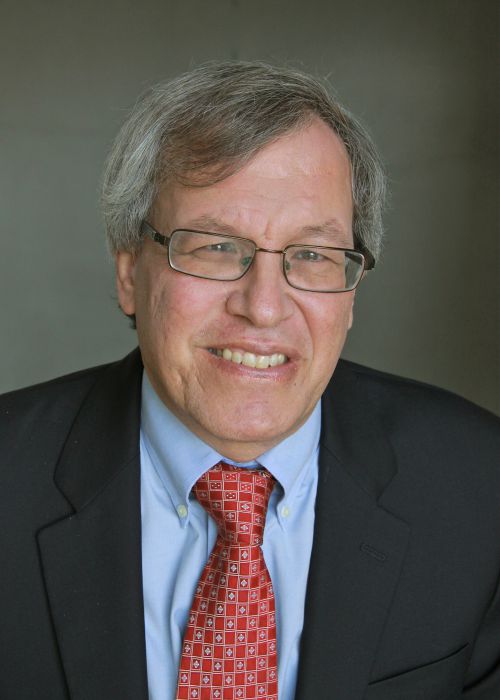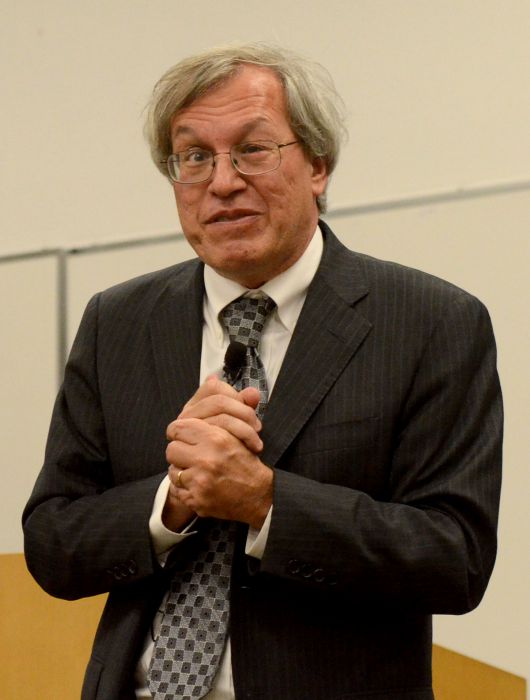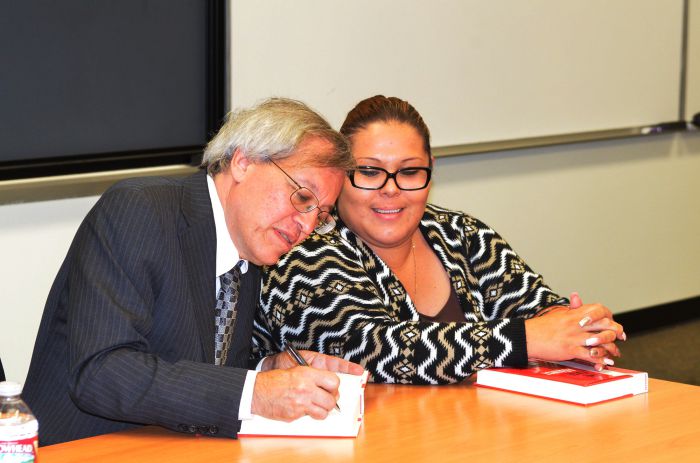
Drawing from his nationally recognized expertise in constitutional law, U.S. Supreme Court rulings and appellate litigation, Erwin Chemerinsky recently spoke at California State University, Dominguez Hills (CSUDH) to address some of today’s most pressing societal issues related to equality and the role law has played in addressing them.
Chemerinsky, founding dean and professor of law at the University of California, Irvine’s (UCI) School of Law, visited campus as the first speaker of the CSUDH’s Public Policy Institute’s inaugural Social Justice Distinguished Speakers Series. The lecture was the first of many upcoming events planned by the institute that will engage the community in a compelling dialogue related to social justice.
Understanding the trepidation some have with lawyers and the legal system, Chemerinsky asked the nearly 100 audience members “Why go to a lawyer?” before providing insights into why they should.
“If someone is injured and needs to be able to recover money to pay medical bills, who do they go to? They go to a lawyer. If someone is arrested for a crime, maybe even arrested wrongly, who do they go to? A lawyer. If there’s a divorce or in a custody battle, people need to go to a lawyer,” said Chemerinsky. “When people’s rights are violated, they go to a lawyer. Whether they’re cases are at the local level, or in Washington heard by the Supreme Court, lawyers have an enormous chance at making a difference in people’s lives.”
Chemerinsky, who frequently argues cases before the nation’s highest courts including the Supreme Court and serves as a commentator on legal issues for national and local media, is the author of eight books, including “The Case Against the Supreme Court,” which was published last year. The book was named a finalist for the 2015 American Bar Association Silver Gavel Award, the organization’s highest honor. He signed the book for many of those at his lecture after he spoke.
Shari Berkowitz, associate professor of criminal justice administration at CSUDH, who introduced Chemerinsky at the event, sat on the dean selection committee that appointed him in 2007 when she was a student at UCI.
“Dean Chemerinsky speaks up and fights for the rights of those who voices are often ignored, and he’s committed to making our world a better place,” said Berkowitz, who also stated that he often provides pro bono representation for individuals who do not have the funds to hire an attorney. “There’s really no doubt about it, Dean Chemerinsky is a social justice superhero!”
 Chemerinsky proposed a series of questions to overall encapsulate what he would address during his remarks: To what extent can law work make a difference in society?; When does law have the capability to change society and make it better?; and What limits are there in the ability to change laws in society?
Chemerinsky proposed a series of questions to overall encapsulate what he would address during his remarks: To what extent can law work make a difference in society?; When does law have the capability to change society and make it better?; and What limits are there in the ability to change laws in society?
The questions were used to examine racial equality, sexual orientation, and the lack of “economic justice” in the United States.
“I would say that at least with the first two topics laws had significant triumphs, and yet, a lot still needs to be done,” he said. “And with the third [economic justice], laws have done far too little.”
Two of the most significant triumphs Chemerinsky referred to in regards to racial equality were the Civil Rights Act of 1964, which he called “the most important act adopted in my lifetime,” and the Supreme Court decision of Brown vs. the Board of Education in 1954.
“On May 17 of last year we celebrated the 60th anniversary on the Supreme Court’s decision in Brown vs. Board of Education, one of the most important Supreme Court decisions ever,” said Chemerinsky, who believes that lessons can be learned from such cases in regards to when a social movement for equality is likely to succeed, and likely to fail. “The Supreme Count finally said that laws that require racial segregation are unconstitutional–that separate can never be equal. Yet, when you look at American public schools today, they’re separate and unequal and are becoming more separate and more unequal at an accelerating rate.”
Unlike the nation’s stagnant progress in racial equality, Chemerinsky believes that the positive social and legal changes made in the move toward equality related to sexual orientation has come a long way in 10 years, a relatively short period of time.

In 1961, all 50 states and the District of Columbia had laws that prohibited private, consensual, and adult same sex sexual activity. California became one of the first states to repeal its law.
“It wasn’t until the year 2003 that the Supreme Court also ruled, in Lawrence vs. Texas, that it violates the Constitution to criminally prohibit people from engaging in sex in their own bedrooms,” said Chemerinsky. “Supreme Court Justice Anthony Kennedy said, ‘If the right to privacy means anything isn’t it what consenting adults do in their own bedroom?’”
Just 12 years ago in 2003, it was illegal for same sex couples to marry in all 50 states, according to Chemerinsky.
“Yet, as I speak to you today, in 38 states same sex couples now have the right to marry,” he said.
Chemerinsky then made an educated prediction: next month on Tuesday, June 30 at 10 a.m. (Eastern Time), the U.S. Supreme Court would find that state laws prohibiting marriage equality violate equal protection in the Constitution.
“Why am I so sure about my prediction? There’s a case that’s going to be argued in the Supreme Court in weeks that challenges the law in four states that prohibit same sex couples from marrying,” he said of the case that was heard by the Supreme Court on April 28. “I think the Supreme Court is going to declare these laws unconstitutional so that every state has to allow gays and lesbians to marry.”
To further strengthen the validity of his prediction and the exact movement it will happen, Chemerinsky explained that on June 30 the Supreme Court will finish its current term and often looks to make major rulings on that day. He believes Supreme Court Associate Justice Anthony Kennedy, who has been the swing vote on many of the court’s 5-4 decisions related to same sex marriage in the last 10 years will lead the charge.
“I think Kennedy sees his most lasting legacy will be expanding rights for gays and lesbians, and I have no doubt the liberal justices will all agree with Justice Kennedy,” he said. “I even think that [Chief Justice] John Roberts, a conservative, will agree. John Roberts wants to be on the right side of history. Like Kennedy, he’s someone who really cares about his legacy, and he knows where history is going.”
Chemerinsky said that even with such a monumental ruling that there will still be so much that needs to be done, pointing to that fact that there is still no federal law that prohibits employment discrimination against gays and lesbians.
Another form of inequality Chemerinsky addressed during his remarks is the failure of the legal system is its ability to deal with the inequalities that exist in regards to wealth, especially inequalities on the basis of race.

According to the 2010 U.S. census, 9.7 percent of whites lived below the poverty line at that time, while 27.2 percent of African Americans and 25.6 percent of Latinos fell below. It was worse for children. While 20 percent of all children in the nation live below the poverty line, 17 percent are Caucasian, 35.3 are African American, and 32.5 Latino.
“The law has done very little to provide more equality, or what I call economic justice,” said Chemerinsky. “In fact, in a series of cases, the Supreme Court has said that discrimination against the poor does not violate the Constitution. In the language of constitutional law the Supreme Court has said that though race and gender are a basis for the government to grant distinctions, poverty is not in the so-called suspect classifications.”
Many types of human rights are not mentioned in the text of the constitution, according to Chemerinsky, but many “fundamental rights” have been found to be there by the Supreme Court.
“There’s no right to food in the Constitution, there’s no right to shelter in the Constitution, and there’s not right to medical care in the Constitution,” he said. “Many countries around the world guarantee in their constitutions the right to education, food, shelter, health care, but not in the Unites States.”
Chemerinsky believes that today it almost seems “unthinkable to say that we can provide economic justice in the Constitution.”
“But what are all of our other rights worth if we can’t get the food we need to exist, if we don’t have a place to live or decent medical care?,” he asked. “…For those of you who are thinking of going to law school, I believe the challenge for you and your generation is to use the law as a tool for economic justice. …So the answer to the original question is ‘Yes, lawyers can make a difference.’ You and your generation are the ones who can do that.”